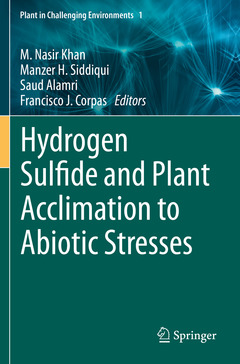Description
Hydrogen Sulfide and Plant Acclimation to Abiotic Stresses, 1st ed. 2021
Plant in Challenging Environments Series, Vol. 1
Language: English
Subjects for Hydrogen Sulfide and Plant Acclimation to Abiotic Stresses:
Keywords
Hydrogen sulfide; Cysteine; Gasotransmitter; Abiotic stress; Sulfur
Publication date: 09-2022
238 p. · 15.5x23.5 cm · Paperback
Publication date: 08-2021
238 p. · 15.5x23.5 cm · Hardback
Description
/li>Contents
/li>Biography
/li>Comment
/li>
This book focuses on the role of hydrogen sulfide in the protection of plants against abiotic stresses and abiotic stress-induced complications by the way of converging advanced key methods of proteomics, genomics, and metabolomics. It provides an update on the biosynthesis, signaling, and mechanism of action of hydrogen sulfide in combating abiotic stresses in plants. Also, special emphasis is given to the interaction of hydrogen sulfide with other signaling molecules (such as nitric oxide, carbon monoxide, hydrogen peroxide etc.), phytohormones, mineral nutrients, ions, and ion channels in plants.
This work, uniquely, covers key aspects of hydrogen sulfide signaling in relation to abiotic stresses in plants, including programmed cell death, stomatal movement, and fruit ripening.
Dr. M. Nasir Khan received his Ph.D. in Botany from Aligarh Muslim University in Aligarh, India, with a specialization in Plant Physiology. After completing his Ph.D., he was awarded research associate by the Council of Scientific and Industrial Research (CSIR), New Delhi, India, and environmentalist of the year 2011 by the National Environmental Science Academy (NESA), India. Dr. Khan is currently serving as an Associate Professor at the University of Tabuk in Saudi Arabia. His research focuses on the mechanisms of abiotic stress tolerance in crop plants. Dr. Khan has completed several research projects and published research papers and review articles in prestigious international journals and edited two books with Springer publishing.
Dr. Manzer H. Siddiqui is working as an Associate Professor in the Department of Botany and Microbiology, King Saud University, Saudi Arabia. Dr. Siddiqui has more than 17 years of research experience in crop production with special emphasis on the management strategies of different fertilizers and plant growth regulators. He explored the role of signaling molecules (nitric oxide and hydrogen sulfide) in plant growth and metabolism under abiotic stress. He is also interested in unveiling the physiological and molecular basis of mechanisms of tolerance of plants to different environmental stresses. Dr. Siddiqui has published nearly 120 research and review articles in peer-reviewed journals and also edited two books.
Dr. Saud Alamri completed his M.Sc. and B.Sc. degrees from King Saud University Riyadh, Saudi Arabia. He did Ph. D. from the University of Western Australia in the year 2014. At present Dr. Alamri is working as Assistant Professor at King Saud University Riyadh, Saudi Arabia. He is working on the plants in association with abiotic stresses. Much of his studies have been focusing on the physiological and molecular responses of plants to different environmental stresses.Dr.
These books may interest you

Hormones and Plant Response 189.89 €



